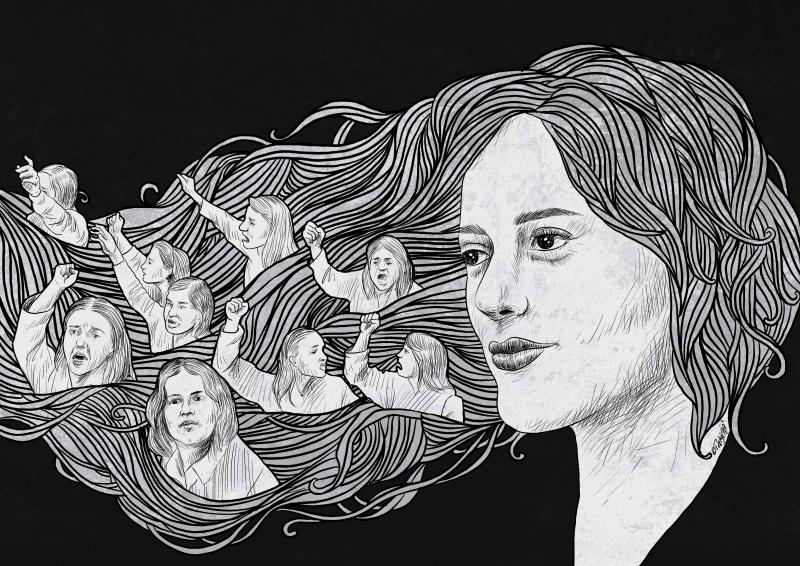
Ewa Majewska is a Polish feminist, activist and philosopher. She works at the SWPS University in Warsaw and is the author of Feminist Anti-Fascism, Counterpublics of the Common (Verso Books publisher, 2021). She was interviewed on the sidelines of the International Marxist Feminist Conference which took place in Warsaw last November.
Cross-border Talks: What do you think feminism is today and what are its most important tasks?
Ewa Majewska: I think the most popular notion of feminism actually has a lot to do with equality between men and women. It is a liberal notion that suggests that the feminist mission will be accomplished when women have the status of men. That is a misunderstanding of feminists. It's the one I'm really not happy with because I think it's very reductionist. Real feminism, or the feminism that I'm happy with and that I want to promote, is a theory and also a practice of political agency that starts from the experience of being socialised and educated and growing up as a woman. We need this theory, practice and political agency to understand different versions of inequalities, different versions of discrimination, different alternatives to neoliberal capitalist patriarchy.
So for me feminism is rooted in a version of socially constructed experience, embodied experience in which people learn to be second-class human beings and in which they build their emancipatory claims. So for me, feminism is not just reduced to issues of men-women or masculinity-femininity. It is more about challenging a version of society in which there are privileged and underprivileged people, in which "the natural order" is seen as something hierarchical, in which some version of leader or God is at the top, and then there are men and women and slaves, or people who are underprivileged, or people who are discriminated against for other reasons, such as sexual orientation, class, religion or ethnicity.
For me, feminism is a fairly broad doctrine. I'm not afraid of saying it's a big ideology. It's a big theory that starts with the embodied and socially constructed experience of femininity. But then it goes much further and includes the experience of other discriminated forms of life. It builds utopias or alternatives that challenge the status quo. A big part of feminism is also criticism of the existing society. And self-criticism. I think this is something that Bell Hooks, one of my favourite feminist writers, has said many times: that feminism sometimes has this amazing ability, which at times becomes an obstacle, to be overly critical of itself.
Feminism is the social movement and the theory that is probably the most self-critical of all political positions, theories and forms of activism. And that is good, because it means that we are trying to change our theoretical position, our political demands, our forms of activism, our forms of being. And we tend to try to see the problem on our side as well, not just of whoever is being criticised or contested.
For me, feminism is an effort to build an egalitarian society driven by solidarity and altruism rather than competition and struggle. I don't think we have to eliminate conflict from our worldview. I think feminists can very well be dialectical or Marxist. But I think a certain idealistic version of society would be one in which those conflicts are resolved respectfully and with care for everyone.
“Feminisms are feminisms. They grow out of a rejection of inequality, the oppression and discrimination of women, the treatment of women as a resource”
That would be the difference between my vision of feminism and the liberal vision of feminism, in which we focus on individuals and their rights rather than on people's social make-up. The version of feminism that I support also has strong economic claims and is very much at odds with neoliberal economics. So I think that competition-based economics, which is based on the idea of immediate profit and which upholds the unequal division of labour and profits, is absolutely at odds with feminism.
I have to emphasise that a lot of what for me is the feminist struggle teaches us to embrace other struggles, including the struggles of trans and non-binary people. I don't understand how people who are in any way against trans and non-binary people can call themselves feminists. I think that goes against the core assumption, which is that being discriminated against and oppressed because of one's identity is wrong.
What do you expect to happen in Poland after the elections, in terms of women's rights?
In the next three or four months we're going to see a lot of fighting, a lot of negotiations and a lot of efforts to bribe different people, to convince them to change their political positions. But I also have another expectation. What I just described was a very concrete vision of the political manoeuvres that might be to come. But there is another thing that is very important in relation to the election results. I and many feminist friends here in Poland share the experience of waking up in a different country. And this is extremely important, because for the last eight years we've been living in a country governed by two versions of what I would call a state of exception.
On the one hand, we had a lot of fascist policies and political decisions that were taken basically every day. We had the Polish-Belarusian border issues and the atrocities on that border against racialised refugees. We had not only anti-feminist, but basically anti-women legislation, aiming for a greater ban on abortion than the one that already existed. We had anti-LGBTQI+ declarations, statements and efforts to change the law. We had very tragic moments around work.
We had people dying in the workplace because of exhaustion. So, for example, we had doctors and nurses dying in the course of their work. We had at least one worker at Amazon who died of exhaustion during the Covid period. The government did not intervene very much in these situations. Basically we had this state of exception, this situation of treating certain categories of people as enemies, as less than human. But we also suffered from what I call this state of exception, which consists of being constantly provoked by political decisions and statements that cause very intense and very difficult emotions, such as fear, anger and anxiety.
We've been living like this for eight years. Anyone with a progressive position and mindset woke up every day to new atrocities and new hate speech unleashed by the government. The biggest difference now, after the election, is that we don't wake up with this nagging feeling of anxiety, of fear, of some new unacceptable political decision or situation that we have to face and act against. So we're exhausted after eight years of protesting against everything: for women, for gay rights, for refugees, for workers. All these struggles have been on a daily basis, very intense. So I would say we are on the opposition side, and here I don't make much of a distinction between the left and the liberals, because many liberals were genuinely busy criticising the conservative government as well. We're exhausted.
Right now, on the one hand, we're going to see a lot of amusing happenings on the political scene. But on the other hand, at least we don't have that exhaustion, that anger, that fear on a daily basis in our emotional life. That is a fantastic change.
In September 2022, we saw the outbreak of major protests in Iran which were about feminist struggles and against strict controls. Is there an Islamic feminism? Is it the same kind of feminism that we see in the West, or are some other countries making their feminist struggle different in terms of agency?
I would like to make two comments about the way you ask this question. One is that you are very delicate in describing the situation in Iran. I believe that what women and their allies have been struggling with in Iran since last year, since September last year, was actually a genocide against women.
It was not about working conditions or hairdressing or anything like that. It was actually the active efforts of the Iranian state to erase women, basically to kill women. So the situation was much more dramatic than it was described. I make this comment so that we can move on with a slightly altered perception, because I would not reduce the protest in Iran to hairstyles or education or women's rights in that mild way. I'd say it was the right to live as a woman that was at stake there.
And another thing is that I find it very problematic to talk about Islamic feminism, because if we want to talk about Islamic feminism, we also have to talk about Catholic feminism or atheist feminism. We would be dividing feminism into religious, regional or cultural contexts, something to be avoided. We don't talk much about European feminism, for example, mainly because it's perceived to be so diverse. There is feminist literature, including a whole postmodern variety.
So I'm quite against being open to the idea of Islamic feminism, because in the countries that are considered Islamic, we have Marxists, we have postmodernists, we have traditionalists. You know, feminisms are feminisms. They are not influenced by the cultural context alone. They grow out of a rejection of inequality, the oppression and discrimination of women, the treatment of women as a resource, as a source of unpaid and invisible labour, as a source of reproductive power. And this struggle is very similar in Poland, in Iran, in the USA, in Brazil, everywhere. So for me, the very concept of Islamic feminism is an idea that comes from Europe, an idea that is based on our attempt to understand the world regionally. And I don't think that's the best way of looking at the world.
So I would talk about women in Iran, or feminists in Iran, but I wouldn't call them Islamic feminists, because they might be against Islam, or they might want to preserve a certain version of Islam, but at the same time they might want to promote Marxist economics, for example.
In this region that is perceived as Islamic, we have Rojava women, we have Palestinian women, we have Iranian women. We have women in Iraq and Afghanistan who are building slightly different versions of feminism. But what unites them is not Islam. That is not the main issue for feminists. Nowhere, not even in countries where Islam is the biggest religion, is it the biggest issue. Their main concern is always the situation and the position of women but also of all those areas of culture, of society, of the economy that are perceived as feminine: social reproduction, invisible work, the care sector and other areas where what is perceived as culturally feminine is simultaneously abused and discriminated against.
And I think that in Islamic regions of the world, as everywhere else in the world, women have very different answers to these problems. What I admire about the women in Islamic countries who are fighting for rights and equality and for feminism is that they are amazingly brave. The courage to be a feminist in those parts of the world, it really is amazing. So perhaps that would be the one difference that I see.












